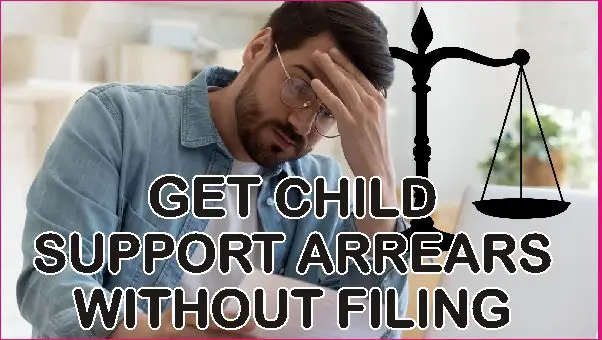
Arrears may build up if a parent does not pay the full amount due in child support. The sum above shows how much back child support the earning parent is obligated to pay. Retroactive child support means the amount owed for child support for a period of time before the child support action or petition was filed before a court.
The sum of money for the child assistance may be determined by:
- How much the non-custodial parent would’ve had to pay at the time in accordance with the child support standards; or
- The “fair share” of the actual costs incurred for the child’s care throughout that time belongs to the non-custodial parent.
Many custodial parents out of ignorance realize that they had spent quite a lot of money on child support before realizing they are due for the reimbursement. Such parents frequently research if they can get back child support if they never filed for it in the first place. This article explains all about it
Can I Get Back Child Support if I Never Filed?
Yes. A custodial parent can get paid back child support despite not filing for it due to various circumstances, including:
- The petition might be brought up by the state CSS, not necessarily the custodial parent. The CSS has many mechanisms for collecting back child support on your behalf without you filing a suit.
- Both parents may reach an agreement on back child support. The custodial parent may actually threaten to sue in order to get the non-custodial parent to bulge and start paying.
- A judge may in rare circumstances demand that the non-custodial parent make back child support payments to the custodial parent.
- You can use the services of debt collectors who have mechanisms for collecting such back child support.
How to Get Back Child Support

There are many ways to follow How to Get Back Child Support
Finding a place to turn for assistance is the first step in obtaining child support from the “obligor” (the parent who is required to pay). You must follow the correct legal procedures in order to enforce a child support order.
Depending on local legislation, you may need to contact a specific government agency or law enforcement division to execute your child support order(s) and collect overdue support.
The local department of child support services is typically responsible for enforcing court orders. (By contacting your state’s child support agency, you can learn more about how child support is enforced where you live.)
Numerous tools are available to child support agencies to enforce and collect back child support. The most popular techniques these organizations employ to try to collect past-due child support are broken down below.
- Income Withholding, often known as “income assignment” or “wage garnishment.”
- Withhold federal tax refund payments and other government payments.
- Putting a lien on the debtor’s parent’s property
- Seize the debtor’s assets to pay the outstanding child support
- Order financial institutions to freeze an obligor’s account (such as banks, credit unions, and insurance companies).
- Request that the state suspends or withdraw an obligation’s professional license, such as a real estate broker’s, medical, legal, or driver’s license.
- Withholding other sources of income, such as commissions, bonuses from employment, pension benefits, retirement accounts, workers’ compensation, disability payments, veteran’s benefits, and military pay.
- Enforcing it in other states via the Uniform Interstate Family Support Act.
- Going to Court – If none of these measures of enforcement are successful, the state child support agency may file a lawsuit. The obliging party could then be found in contempt of court by the judge, which could result in penalties or even jail time.
Can I Sue for Back Child Support if There is no Court Order?
Yes, you can request back child support. However, in some state laws, certain conditions do permit the ordering of retroactive child support. It isn’t regarded as “back child support,” though. The custodial parent must instead directly ask the court to impose retroactive child support orders. In some ways, this is comparable to filing a claim for unpaid child support in the absence of a court order.
How to File for Child Support if You Never Filed
The first step in getting back child support if you never filed is to establish a court order for child support. Here’s how:
- Determine the Non-Custodial Parent’s Location: If you don’t know where the non-custodial parent is located, you’ll need to take steps to find out. This can be done through a process server or by contacting the local child support enforcement agency.
- File a Petition for Child Support: Once you’ve located the non-custodial parent, you’ll need to file a petition for child support. This can be done in the state where the child lives or in the state where the non-custodial parent lives.
- Serve the Non-Custodial Parent: After you’ve filed the petition, the non-custodial parent must be served with a copy of the petition and a summons.
- Attend a Hearing: If the non-custodial parent doesn’t contest the petition, a court hearing will be scheduled. If the non-custodial parent does contest the petition, you’ll need to attend a hearing to present your case.
- Obtain a Court Order: After the hearing, the court will issue a court order for child support. The court order will specify the amount of child support the non-custodial parent must pay and the frequency of payments.
Conclusion
As can be seen from this article, you can get back child support if you never filed a suit or petition. The various circumstances where this is possible are itemized above. Also listed are different ways how to back child support, which are essentially other ways how retroactive child support is paid. We hope you found this insightful.
If you are the obligor but unable to afford the payment, note that you can have the obligation reduced by embracing the child support arrears dismissed.
If you need more support, you can request an expert family law attorney who can assist you walk through all this flawlessly.




